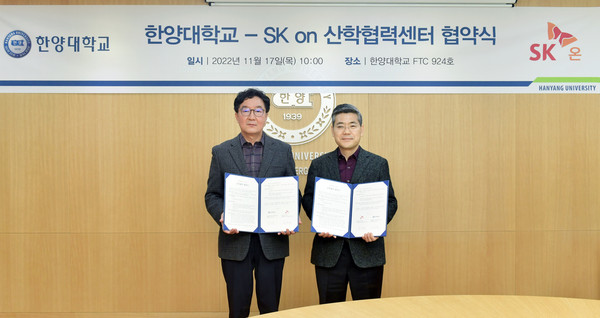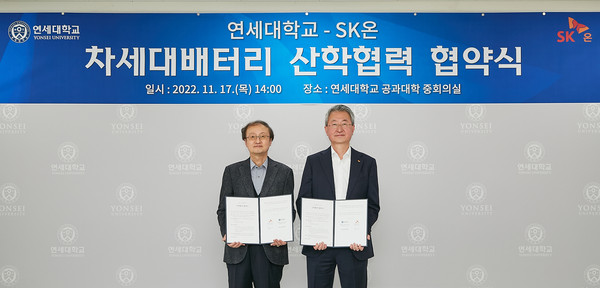Conduct joint research on innovative technologies based on original technology for next-generation batteries
SK On joins hands with leading universities in Korea to strengthen R&D capabilities for next-generation batteries.
SK On announced on Nov. 18 that it had signed a business agreement with Hanyang University and Yonsei University to establish an industry-university cooperation center.
On Nov. 17 SK On held an agreement ceremony at Hanyang University Fusion Tech Center in Seongdong-gu, Seoul. The event was attended by Dean Kim Chan-hyung of Hanyang University College of Engineering, Professor Kim Han-soo of battery engineering at Hanyang University, and Manager Choi Kyung-hwan of SK On's next-generation battery department.

That same day, the agreement was signed at Yonsei University's Engineering Building 1 in Seodaemun-gu, Seoul, with Vice President Park Seung-han of Yonsei University of Research Affairs, and COO Jin Kyo-won of SK On in attendance.
Both universities have many papers and patents related to all-solid-state batteries. The industry-university cooperation center to be established this time will also be participated by professors and researchers with master's and doctoral degrees in the field of next-generation batteries.
Under this agreement, SK On and the two universities plan to jointly research next-generation battery innovation technologies based on various source technology research, including the development of lithium protective layer materials. Through this, the goal is to accelerate the development and commercialization of next-generation batteries.
All-solid-state batteries are the safest and have high energy density, so they are called ‘dream batteries.’ SK On has been strengthening its R&D capabilities through various measures with the goal of commercializing all-solid-state batteries in 2029.

In Korea, the SK On Next Generation Battery Research Center (in Daejeon) is independently developing sulfide-based, oxide-based, and polymer-based solid electrolytes and lithium metal anodes. In particular, SK On is concentrating on research and development, such as ▲development of all-solid-state battery materials through design and synthesis of core materials for solid electrolytes and cathodes ▲development of lithium protective layer materials to extend cell life.
Investments in advanced overseas companies and collaboration with researchers are also active. In October of last year, SK On invested $30 million (approximately 35 billion won) in Solid Power, a leading all-solid-state battery company in the US. The two companies are aiming to develop prototypes of sulfide-based all-solid-state batteries by 2025 at the earliest and begin full-scale mass production in 2029.
In January they joined hands with Professor Lee Seung-woo of Georgia Institute of Technology in the United States to develop an all-solid-state. Professor Lee developed a rubber-type polymer solid electrolyte with KAIST and published a thesis in the world-renowned journal Nature. In addition, SK On is conducting research and development of next-generation batteries with 2019 Nobel Prize in Chemistry Professor John B. Goodenough of Texas University, Professor Hwang Kyung-soon, Professor Lee Sang-bok of Maryland University, and Professor Brian Sheldon of Brown University.
Meanwhile, through this cooperation, SK On is also planning to seek ways to connect key talents with master's and doctoral degrees who will be researched at the industry-academia cooperation centers of both universities with recruitment. This is part of a strategy to strengthen R&D competitiveness by securing excellent human resources.
SK On has already made efforts to establish an infrastructure for nurturing human resources by opening contract departments with Hanyang University, Sungkyunkwan University, and Ulsan Institute of Science and Technology, respectively. SK On proceeds with recruitment for five years from the time these departments produce their first graduates. Up to 200 people are expected.
COO Jin Kyo-won of SK On said, "SK On's excellent R&D capabilities, proven with high-nickel technology, will be further strengthened through collaboration with universities." He continued, “SK On will continue to do its best to strengthen the competitiveness of the Korean battery industry.”
Dean Kim Chan-hyung of the College of Engineering at Hanyang University, said, “This cooperation will serve as an opportunity to develop batteries with better performance.”
Vice President Park Seung-han of Research at Yonsei University, said, “Yonsei University, which has the strength of battery basic materials and analysis capabilities, and SK On, which has battery design, evaluation and mass production capabilities, have teamed up to present a new model for industry-university cooperation in Korea.” He continued, “In the secondary battery field, where fierce competition is taking place, we expect this cooperation to contribute to securing differentiated technological competitiveness and fostering excellent human resources
.”

